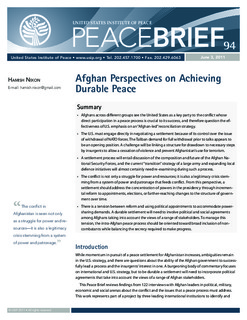| dc.contributor.author | Nixon, Hamish | |
| dc.date.accessioned | 2018-01-04T08:17:04Z | |
| dc.date.available | 2018-01-04T08:17:04Z | |
| dc.date.issued | 2011-06-15 | |
| dc.identifier | oai:www.cmi.no:4046 | |
| dc.identifier.citation | United States Institute of Peace (USIP) (Peace Brief no. 94) pp. 1-5 | |
| dc.identifier.uri | http://hdl.handle.net/11250/2474705 | |
| dc.description.abstract | While momentum in pursuit of a peace settlement for Afghanistan increases, ambiguities remain in the U.S. strategy, and there are questions about the ability of the Afghan government to successfully lead a process and the insurgents’ interest in one. A burgeoning body of commentary focuses on international and U.S. strategy, but to be durable a settlement will need to incorporate political agreements that take into account the views of a range of Afghan stakeholders.
This Peace Brief reviews findings from 122 interviews with Afghan leaders in political, military, economic and social arenas about the conflict and the issues that a peace process must address. This work represents part of a project by three leading international institutions to identify and clarify realistic options for Afghanistan to achieve durable peace. Ongoing work analyzes the issues framed by Afghan stakeholders more deeply and draws on comparative experience. | |
| dc.language.iso | eng | |
| dc.publisher | United States Institute of Peace (USIP) | |
| dc.relation | Peace Brief | |
| dc.relation | 94 | |
| dc.relation.ispartof | Peace Brief | |
| dc.relation.ispartofseries | Peace Brief 94 | |
| dc.relation.uri | https://www.cmi.no/publications/4046-afghan-perspectives-on-achieving-durable-peace | |
| dc.subject | Afghanistan | |
| dc.title | Afghan perspectives on achieving durable peace | |
| dc.type | Research report | |
